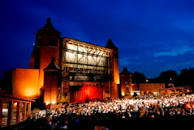By Deb Churchill
Tyler Schyvinck, facilities manager at Starlight Theatre, and I had the opportunity to attend the 2020 Academy for Venue Safety & Security thanks to a grant funded by LYRASIS and Performing Arts Readiness (PAR). The Academy for Venue Safety & Security provides education and experiences to develop and enhance safety and security capabilities of venue managers and others who serve the venue and event industry.
The faculty was made up of experts including venue managers and industry leaders. The primary focus was intense  training of best practices that equips attendees with information, tools and methodologies to protect guests, customers, employees, property, and assets through risk identification, implementation of risk management practices and procedures, emergency planning, preservation of economic viability, and facilitation of recovery.
training of best practices that equips attendees with information, tools and methodologies to protect guests, customers, employees, property, and assets through risk identification, implementation of risk management practices and procedures, emergency planning, preservation of economic viability, and facilitation of recovery.
The Year One curriculum specifically addressed incident reporting, risk assessment & management and related legal issues, planning for event medical services, creating event safety briefings, event security operations, facility security operations, tactical first aid and responding to mass casualties, risk-based venue emergency planning and the functional elements of a venue emergency plan, crowd management theory and practice, building and life safety codes, the principles of training, and how to create and deliver training programs. We also engaged in experiential exercises, viewed footage of actual occurrences to study trends, movements and making adjustments in real time, as well as toured and heard from various operational directors at the convention center.
We have a “Duty of Care” for those that attend events in our venue which means we have an obligation to take reasonable steps to prevent foreseeable harm. So, in a preparedness cycle we should be able to prepare, prevent, respond, and recover from circumstances that have potential to occur. The physicality of the venue should always be monitored for safety and response preparedness, assuring repairs are complete and emergency and medical equipment is tested, properly signed and in its proper locations. Risk cannot be eliminated but with proactive planning and implementation, we can minimize our risks. Operational readiness and optimizing team performance through proper training is essential for our success and managing Starlight Theatre.
The knowledge that the instructors had and shared was so relevant and makes you think about whether you are truly prepared. We came back with many new ideas, the need to review existing emergency and medical equipment, to walk the venue with a renewed perspective, to train and reiterate emergency protocol and to rate ourselves on our readiness. The two key phrases of “See Something; Say Something” and “KISS: Keep It Simple Silly” can make safety and security something everyone can help with and relate to. Tyler and I were on the Spartans team and the network of the peers in our group and all those in attendance is invaluable. We look forward to Year Two – GO SPARTANS!”
Tyler’s comment on the experience was that, “The AVSS training was a fire hose of information, but all incredibly valuable and pertinent to our roles we have at Starlight. AVSS helped me highlight processes and procedures we can improve on and gave me the tools to work on them. The opportunity to connect with other like venues across the country also provided insight on how they are tackling the same issues.”
Deb Churchill is vice president of operations at Starlight Theatre in Kansas City, Missouri.
